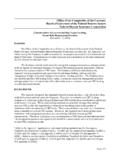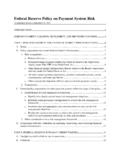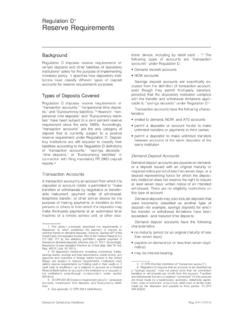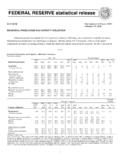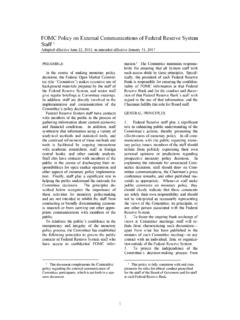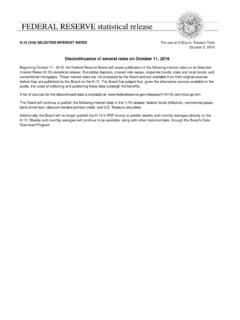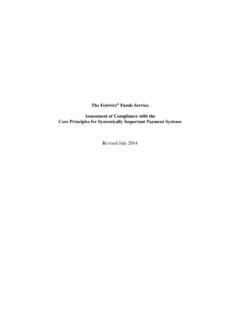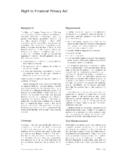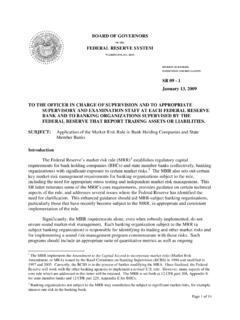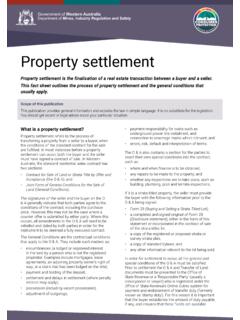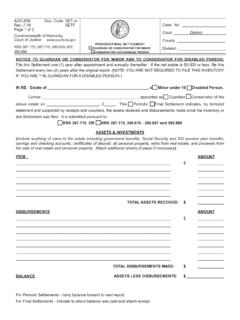Transcription of Real Estate Settlement Procedures Act - Federal Reserve
1 1. A lender includes a financial institution either regulated by or whose deposits or accounts are insured by any agency of the Federal government. 2. A creditor is defined in section 103(f) of the Consumer Credit Protection Act (15 USC 1602(f)). RESPA covers any creditor that makes or invests in residential real Estate loans aggregating to more than $1,000,000 a year. 3. Dealer is defined in Regulation X as a seller, contractor, or supplier of goods or services. Dealer loans are covered by RESPA if the obligations are to be assigned before the first payment is due to any lender or creditor otherwise subject to the regulation.
2 Consumer Compliance Handbook 4. FNMA, Federal National Mortgage Association; GNMA, Government National Mortgage Association; FHLMC, Federal Home Loan Mortgage Corporation. Real Estate Settlement Procedures Act Background The Real Estate Settlement Procedures Act of 1974 (RESPA) (12 USC 2601-17), which is implemented by the Department of Housing and Urban Devel opment s Regulation X (24 CFR 3500), became effective in June 1975. The act requires lenders, mortgage brokers, and servicers of home loans to provide borrowers with pertinent and timely disclo sures about the nature and costs of the real Estate Settlement process.
3 It also protects borrowers against certain abusive practices, such as kick backs, and places limitations on the use of escrow accounts. Since its enactment, RESPA has been amended several times to cover, among other things, subor dinate loans; required disclosures for the transfer, sale, or assignment of mortgage servicing; rules for mortgage escrow accounts, including the account ing method to be used for these accounts; required disclosures; and the established formats and pro cedures for initial and annual escrow statements.
4 Coverage Section (a) RESPA is applicable to all federally related mort gage loans. Federally related mortgage loans are loans, including refinances, secured by a first or subordinate lien on residential real property upon which A one-to four-family structure is located or is to be constructed using proceeds of the loan (including individual units of condominiums and cooperatives) or A manufactured home is located or is to be constructed using proceeds of the loan In addition, the federally related mortage loan must meet one of the following conditions.
5 Made by a lender,1 creditor,2 or dealer3 Made by or insured by an agency of the Federal government Made in connection with a housing or urban development program administered by an agency of the Federal government Made by and intended to be sold by the originating lender or creditor to FNMA, GNMA, or FHLMC (or its successor)4 Subject of a home equity conversion mortgage or a reverse mortgage issued by a lender or creditor subject to the regulation Made by a lender, dealer, or creditor subject to the regulation and used in whole or in part to fund an installment sales contract, land contract, or contract for deed on otherwise qualifying residential property Exemptions Section (b) The following transactions are exempt from RESPA.
6 A loan on property of twenty-five acres or more (whether or not a dwelling is located on the property) A loan primarily for business, commercial, or agricultural purposes (as defined in section (a)(1) of Regulation Z) A temporary loan, such as a construction loan (The exemption does not apply if the loan is used as, or may be converted to, permanent financing by the same financial institution.) If the lender issues a commitment for permanent financing, the loan is covered. A construction loan with a term of two years or more is covered unless it is made to a bona fide contractor.
7 Bridge and swing loans are not covered. A loan secured by vacant or unimproved prop erty when no proceeds of the loan will be used to construct a one-to four-family residential struc ture. If the proceeds will be used to locate a manufactured home or construct a structure within two years from the date of Settlement , the loan is covered. An assumption, unless the mortgage instruments require lender approval for the assumption and the lender actually approves the assumption A renewal or modification when the original obligation (note) is still in effect but modified A bona fide transfer of a loan obligation in the secondary market (However, the mortgage servicing transfer disclosure requirements of RESPA 1(1/06) Real Estate Settlement Procedures Act 24 CFR still apply.)
8 Mortgage broker transactions that are table-funded (that is, the loan is funded by a contemporaneous advance of loan funds and an assignment of the loan to the person advancing the funds) are not secondary-market transactions and therefore are covered by RESPA. The exemption does not apply if there is a transfer of title to the property. Requirements Special Information Booklet ( ) A financial institution is required to provide a borrower with a copy of the special information booklet at the time a written application is sub mitted or no later than three business days after the application is received.
9 If the application is denied before the end of the three-business-day period, the institution is not required to provide the booklet. If the borrower uses a mortgage broker, the broker rather than the institution must provide the booklet. An application includes the submission of a borrower s financial information, either written or computer generated, for a credit decision on a federally related mortgage loan. To be consid ered a written application, the submission must state or identify a specific property. The subse quent addition of an identified property to the submission converts the submission to an appli cation for a federally related mortgage loan.
10 (section (b)) A financial institution that complies with Regula tion Z for open-end home equity plans is deemed to have complied with this section of the regulation. The booklet does not need to be given for refinancing transactions, closed-end subordinate-lien mortgage loans, or reverse mortgage trans actions or for any other federally related mort gage loan not intended for the purchase of a one-to four-family residential property. Part 1 of the booklet describes the Settlement process and the nature of charges and suggests questions to be asked of lenders, attorneys, and others to clarify what services they will provide for the charges quoted.
